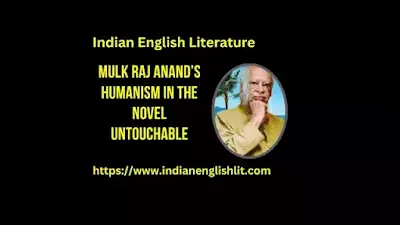Introduction:
Mulk Raj Anand wrote ‘Untouchable’ when Gandhiji's freedom struggle was in full swing, and so he got influenced by his love and sympathy for the untouchables, the suffering and the poor people of Indian society. When the novelist was in England, he read the letters of Karl Marx and was greatly influenced by his human concerns. Anand's early novels plead the cause of the oppressed and show glimpses of the cruel and unkind behaviour of the oppressors. It seems he is a committed writer. He does not write merely for the sake of art . He writes with a purpose. He has a great sympathy for the poor suffering people. His novels have social realism and reveal deep humanism. His ‘Untouchable’ is a very good example of his deep rooted humanism.

Anand's Sympathy for the Untouchables:
The central theme of ‘Untouchable’ is the age old, injustice done to untouchables by traditional Hindu society. In the words of M. K. Naik, “The very choice of the theme was a bold stroke of genius. To make a sweeper the hero of his novel was revolutionary departure for an Indian writer of the Nineteen - Thirties.” During that period the writers mostly wrote about middle classes. They could not write about so low theme as they had no intimate knowledge of such life. Mulk Raj Anand had sympathy and love for the poor suffering Indian people. ‘Untouchable’ is based on his real experiences. As a child he played with the children of sweepers. In fact Bakha, the hero of the novel, is one of his playmates in his childhood. He was well - acquainted with the sorrows, sufferings and exploitations of Bakha, the sweeper - boy. E. M. Forster rightly remarks, “Untouchable could only have been written by an Indian, and by an Indian who observed from the outside. No European, however, sympathetic could have created the character of Bakha because he would not have known enough about his trouble.” Anand was well familiar with the life of Bakha. Therefore, his picture of the hero and his life has a clear touch of authenticity.
Condemnation of Injustice and Exploitation:
In his novel ‘Untouchable’ Mulk Raj Anand denounces the unjust behaviour of the traditional caste - Hindus towards the untouchables. He depicts the poor miserable physical conditions of the outcastes. He throws light on the economic exploitation and social injustice to them through the theme of the novel, its dialogues and various emotionally touching scenes such as well – scene, the touching scene, the molestation scene, the chapati throwing scene and several insults heaped on the head of Bakha and his family . He also reveals the psychology of the untouchables and the caste - Hindus. He remarks, “The caste - Hindus is armed with the feeling of six thousand years of social and class superiority - a feeling which refuses to b accept the fact that the untouchables is a human being, but insists on treating him like a Sub - human creature, to be ignored or bullied or exploited as the occasion demands.”
Consequences of Age Long Exploitation:
The untouchables have been exploited in India since times immemorial, and the bad result of it is that the untouchables have been timid and cowardly. They cannot raise their head against oppression, though at hearts they are well aware of such hated exploitation. Bakha is caught in the vicious circle out of which there is no escape for him. His heart, soul and mind suffer greatly but he is helpless. On the other hand, Lakha and Rakha are fully compromised with the injustice and exploitation done to them. They do not harbour any resentment. External servility has become their lot. Even Bakha only thinks of retaliation but servility of centuries paralyses him. Even at his sister's ill - treatment by the priest he ultimately bows down himself. There are some good caste - Hindus also like Charat Singh and the woman. Bakha has a great love for Charat Singh and is ready to do anything for him. The woman lovingly calls Bakha, “My child, you shouldn't sit on people's door - steps like this.” She hands a chapati to him.
Conclusion:
The novelist understands the psychology of the sweepers as well as the caste - Hindus. His picture of the relationship between these two classes is objective. Apparently he has love and sympathy for the under - dogs - the poor sweepers. His theme is a social theme. He no doubt condemns the unjust behaviour of the caste - Hindus towards the sweepers; hence for these reasons he seems to be tempted to divide his characters into two groups— sheep and goats. But he withstands this temptation. His caste Hindus are not tyrants, nor are all his untouchables admirable, nor yet is the life of his untouchable hero a saga of unrelieved misery. Havildar Charat Singh is good contrast to Kali Nath, and is far above caste prejudices and asks Bakha to bring coal pieces from the kitchen.
His objectivity saves the novelist from sentimentality and protects him against the charges of a propagandist. The novel ‘Untouchable’ is not a social tract on untouchability. The novelist does not indulge in any sentimentality and moralizing. Anand throws light on the poor lot of the untouchables and offers solutions to their problem. The best solution of the problem is the introduction of flush system. If the solution is applied, the untouchables will no more be untouchable. They shall no more be deprived of social intercourse and religious consolation. They shall be treated as human beings. ‘Untouchable’ is an instrument of the humanism of Mulk Raj Anand.






